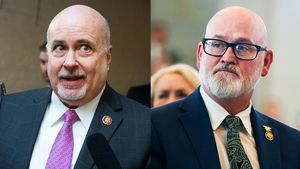A growing number of seniors can't afford their prescription medications.
According to a a study published in JAMA Network Open Thursday, 1 in 5 adults over the age of 65 either skipped, delayed, took less medication, or took someone else's medication due to the cost. This is a jump from a similar study published in 2016, which found 1 in 7 skipping medication because of the price.
Around 30 percent of the respondents surveyed used a copayment card or coupon to afford their prescriptions. Over 8 percent said that they could not afford basic needs such as gas or groceries, with 4.8 percent saying they went into debt to receive their medication.
While the study highlights the importance of universal healthcare, and measures such as the Biden Administration's Inflation Reduction Act — which aimed to lower the cost of prescription drugs — it also emphasizes the importance of physician guidance.
"Prescription drug affordability is a pressing issue," the study reads. "Rising prescription drug costs and increasing prices for consumer goods may increase cost-related medication nonadherence. Cost-conscious prescribing can be supported by real-time benefit tools, but patient views on real-time benefit tool use and their potential benefits and harms are largely unexplored."
Many seniors are unaware of programs or negotiation tactics that can lower prices, yet healthcare providers are reluctant to discuss financial aid, despite almost 90 percent of the respondents saying they were open to discussing prices with their doctor.
As the survey notes: "There has been growing interest in addressing cost-related nonadherence through price-conscious prescribing and engaging in meaningful cost conversations at the point of prescribing."
The report concludes that providing "patient-specific drug prices to prescribers" could not just raise awareness among seniors, but "ensure that prescribers are aware of the price of drugs and their alternatives, thereby addressing a key barrier to both price-conscious prescribing and cost conversations."
Another way to combat the problem lies in physicians indicating to patients that "the prices given are estimates and may be different at the pharmacy," and to "discuss what patients should do if the price discrepancy is large."
"For example, telling patients to have the pharmacist contact the physician if the price is too high would be one way to highlight and prepare the patient for the potential for a price discrepancy and what to do if this occurs," the report explains.
It adds: "Our findings should encourage prescribers to default to conversations whenever possible."



















































